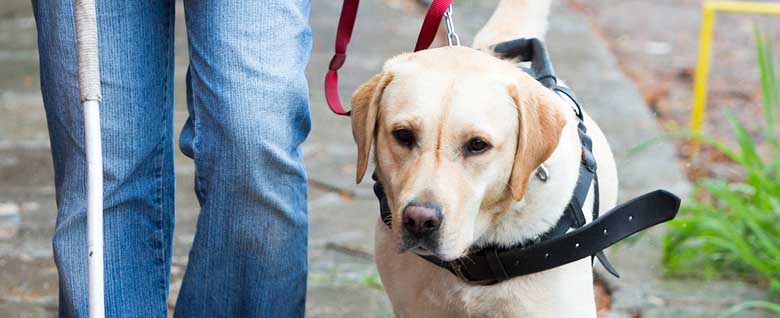Any organisation carrying out a public function and/or service providers needs to be aware of and comply with their obligations under the terms of the Equality Act 2010 to avoid claims of unlawful discrimination.
Discrimination is the unequal treatment of an individual or individuals on the grounds of one or more of the protected characteristics as defined by the Equality Act 2010. In claims relating to assistance dogs, the most relevant protected characteristic is likely to be disability.
What are assistance dogs?
Dogs which qualify as assistance dogs must fit the legal definition provided by the Equality Act 2010. The act defines assistance dogs as those which have been either:
- trained to guide a blind person
- trained to assist a deaf person
- trained by a prescribed charity to assist a disabled person who has a disability that consists of epilepsy or otherwise affects the person's mobility, manual dexterity, physical co-ordination or ability to lift, carry or otherwise move everyday objects, and/or;
- trained to assist somebody with another prescribed disability.
The rights of assistance dog users
Users of assistance dogs have a right under the Equality Act not to be unlawfully discriminated against based on a protected characteristic which causes a detriment to them, when in comparison to others, who do not share the same protected characteristic. Business owners or managers may find themselves subject to allegations of discrimination if they implement and apply inflexible policies, criteria or practices across the client base, which can be considered to cause a detriment to those who use assistance dogs, such as;
- The exclusion of assistance dogs and their users from the business premises, which may be encompassed by the enforcement of a ‘no pets’ rule, without exception given, or;
- The requirement for those who use assistance dogs to pay for additional services, such as cleaning fees and/or staffing costs.
Organisations who carry out a public function and/or provide a service are also under a duty to make reasonable adjustments for individuals who use assistance dogs, to avoid them being placed at a disadvantage as a result of their disability. The duty is to take such steps as it is reasonable to have to take to avoid the individual being subjected to the disadvantage.
A reasonable adjustment may include:
- Allowing assistance dogs to accompany their owners inside a venue; or
- Ensuring sufficient levels of staff and/or cleaning provisions are provided to allow users and their assistance dogs to access a service.
A business shall have to conduct a balancing exercise in order to determine whether an adjustment is ‘reasonable’, which can only be determined upon a case by case basis. Alternatives to any adjustments which are not viable should be reviewed and discussed in line with business needs and user requirements.
What to do if you receive a complaint of discrimination from a service user?
If an individual believes that they have been treated unfavourably and unlawfully discriminated against by your business/organisation or an employee who works for your business or organisation, they may take action against you. As an organisation/business you must act quickly if you receive a complaint of discrimination, or Letter Before Action. Please read the below for further details on dealing with complaints of discrimination as a service provider.
- What happens if a business fails to engage with a complaint of discrimination against them?
- Defending claims of indirect discrimination - the objective justification defence
- How can service providers defend discrimination claims?
It is advisable that businesses provide training to their employees on their obligations under the Equality Act 2010 and their duties to recognise the needs of service users and provide adjustments, where appropriate.
If your business is accused of discrimination, our team can help you. For a no obligation discussion with our specialist discrimination defence solicitors, call us on 01616 966 229.
By Ambre Williams, employment and discrimination advisor



Comments